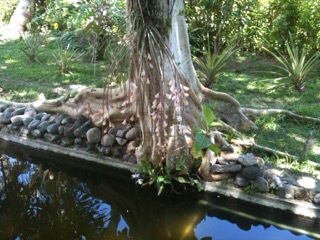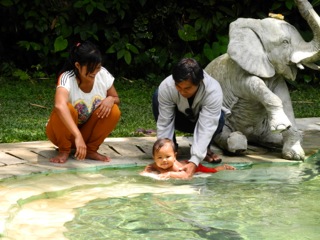What is EM?Professor Teruo Higa, who recognized and developed the use of EM, since its inception has seen growing its philosophy throughout the world.
EM is the abbreviation for Effective #Micro-Organisms. EM is a combination of useful regenerated micro-organisms that exist freely in nature and are not manipulated in any way. This mixture increases the natural resistance of soil, plants, water, humans, and animals.
EM considerably improves the quality and #fertility of soil as well as the growth and quality of crops.
The possibilities and benefits in using EM are numerable and include the following:
• For use in the home in daily life for everyone
• The recycling of kitchen waste and turning it into valuable organic material;
• In the garden to improve soil structure, increase productivity and to suppress both disease and weeds
• For solving all kinds of environmental problems such as water, air, and soil pollution;
• In agriculture and horticulture, fruit and flower cultivation;
• In animal husbandry and for all kinds of pets;
• In fisheries, aquariums and swimming pools;
• In personal bodily hygiene and for the prevention and treatment of health problems.
EM consists of many different kinds of effective, disease-suppressing micro-organisms. Each of these effective micro-organisms has a specific task. In addition, these micro-organisms enhance each others working. This means that synergy occurs!
The micro-organisms are naturally existing and are not modified or manipulated in any way and are cultured according to a specific method. Some of which are known to produce bioactive substances such as vitamins, hormones, enzymes, antioxidants and antibiotics that can directly, or indirectly enhance plant growth and protection.
EM consists of the following five families of micro-organisms:
• #Lactic acid bacteria: these bacteria are differentiated by their powerful sterilizing properties. They suppress harmful micro-organisms and encourage quick breakdown of organic substances. In addition, they can suppress the reproduction of Fusarium, a harmful fungus.
• #Yeasts: these manufacture anti-microbial and useful substances for plant growth. Their metabolites are food for other bacteria such as the lactic acid and actinomycete groups.
• #Actinomycetes: these suppress harmful fungi and bacteria and can live together with photosynthetic bacteria.
• #Photosynthetic bacteria: these bacteria play the leading role in the activity of EM. They synthesize useful substances from secretions of roots, organic matter and/or harmful gases (e.g. hydrogen sulphide) by using sunlight and the heat of soil as sources of energy. They contribute to a better use of sunlight or, in other words, better photosynthesis. The metabolites developed by these micro-organisms are directly absorbed into plants. In addition, these bacteria increase the number of other bacteria and act as nitrogen binders.
• #Fungi that bring about fermentation these break down the organic substances quickly. This suppresses smell and prevents damage that could be caused by harmful insects.
Effective Microorganisms, or EM is one of the most popular microbial technologies being used worldwide now and EM products have been on the market since 1983 in Japan.
EM comes in a liquid form and consists of naturally-occurring beneficial microorganisms.
Throughout the world, EM applications are made in the farming, livestock, environmental clean-up (polluted waterways, lakes and lagoons), and health industries.
What EM is not, is harmful, pathogenic, genetically-engineered/modified (GMO), nor chemically-synthesized. Neither is EM a drug or fertilizer.













